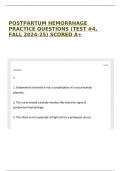Postpartum hemorrhage - Study guides, Class notes & Summaries
Looking for the best study guides, study notes and summaries about Postpartum hemorrhage? On this page you'll find 5587 study documents about Postpartum hemorrhage.
Page 2 out of 5.587 results
Sort by
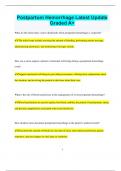
-
Postpartum Hemorrhage Latest Update Graded A+
- Exam (elaborations) • 15 pages • 2024
-
Available in package deal
-
 BrilliantScores
BrilliantScores
-
- $9.99
- + learn more
Postpartum Hemorrhage Latest Update Graded A+ What are the initial steps a nurse should take when postpartum hemorrhage is suspected? The initial steps include assessing the amount of bleeding, performing uterine massage, administering uterotonics, and monitoring vital signs closely. How can a nurse support a patient’s emotional well-being during a postpartum hemorrhage event? Support emotional well-being by providing reassurance, offering clear explanations about the situation...

-
Postpartum Hemorrhage Questions and Answers Already Passed
- Exam (elaborations) • 17 pages • 2024
-
Available in package deal
-
 BrilliantScores
BrilliantScores
-
- $9.99
- + learn more
Postpartum Hemorrhage Questions and Answers Already Passed What are the primary causes of postpartum hemorrhage, and how should each be managed? The primary causes of postpartum hemorrhage include uterine atony, retained placenta, vaginal or cervical lacerations, and coagulation disorders. Management involves uterine massage and oxytocin for uterine atony, manual removal or surgical intervention for retained placenta, repair of lacerations, and treatment of coagulation disorders wit...
POSTPARTUM HEMORRHAGE PRACTICE QUESTIONS (TEST #4, FALL 2024-25) SCORED A+

-
Postpartum Hemorrhage Practice Questions Test 4 Latest Update Graded A+
- Exam (elaborations) • 21 pages • 2024
-
Available in package deal
-
 BrilliantScores
BrilliantScores
-
- $9.99
- + learn more
Postpartum Hemorrhage Practice Questions Test 4 Latest Update Graded A+ What is the primary cause of early postpartum hemorrhage? - A) Uterine atony - B) Placental abruption - C) Lacerations - D) Retained placenta A) Uterine atony *Rationale:* Uterine atony, or failure of the uterus to contract effectively after delivery, is the most common cause of early postpartum hemorrhage. How should a nurse respond if a patient exhibits signs of postpartum hemorrhage within the first 24...
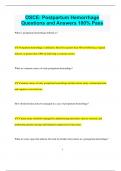
-
OSCE: Postpartum Hemorrhage Questions and Answers 100% Pass
- Exam (elaborations) • 14 pages • 2024
-
Available in package deal
-
 BrilliantScores
BrilliantScores
-
- $9.99
- + learn more
OSCE: Postpartum Hemorrhage Questions and Answers 100% Pass What is postpartum hemorrhage defined as? Postpartum hemorrhage is defined as blood loss greater than 500 ml following a vaginal delivery or greater than 1000 ml following a cesarean section. What are common causes of early postpartum hemorrhage? Common causes of early postpartum hemorrhage include uterine atony, retained placenta, and vaginal or cervical tears. How should uterine atony be managed in a case of postpa...
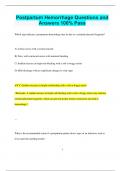
-
Postpartum Hemorrhage Questions and Answers 100% Pass
- Exam (elaborations) • 12 pages • 2024
-
Available in package deal
-
 BrilliantScores
BrilliantScores
-
- $9.99
- + learn more
Postpartum Hemorrhage Questions and Answers 100% Pass Which sign indicates a postpartum hemorrhage may be due to a retained placental fragment? A) Lochia serosa with a normal amount B) Firm, well-contracted uterus with minimal bleeding C) Sudden increase in bright red bleeding with a soft or boggy uterus D) Mild discharge with no significant changes in vital signs C) Sudden increase in bright red bleeding with a soft or boggy uterus *Rationale: A sudden increase in bright red bl...
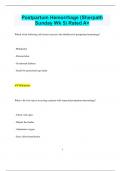
-
Postpartum Hemorrhage (Sherpath Sunday Wk 5) Rated A+
- Exam (elaborations) • 11 pages • 2024
-
Available in package deal
-
 BrilliantScores
BrilliantScores
-
- $9.99
- + learn more
Postpartum Hemorrhage (Sherpath Sunday Wk 5) Rated A+ Which of the following risk factors increases the likelihood of postpartum hemorrhage? - Multiparity - Preterm labor - Gestational diabetes - Small-for-gestational-age infant Multiparity What is the first step in assessing a patient with suspected postpartum hemorrhage? - Check vital signs - Palpate the fundus - Administer oxygen - Start a blood transfusion 2 Palpate the fundus Which medication is commonly g...
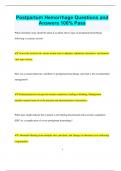
-
Postpartum Hemorrhage Questions and Answers 100% Pass
- Exam (elaborations) • 10 pages • 2024
-
Available in package deal
-
 BrilliantScores
BrilliantScores
-
- $9.99
- + learn more
Postpartum Hemorrhage Questions and Answers 100% Pass What immediate steps should be taken if a patient shows signs of postpartum hemorrhage following a cesarean section? Assess the incision site, ensure uterine tone is adequate, administer uterotonics, and monitor vital signs closely. How can a retained placenta contribute to postpartum hemorrhage, and what is the recommended management? Retained placenta can prevent uterine contraction, leading to bleeding. Management incl...
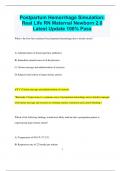
-
Postpartum Hemorrhage Simulation: Real Life RN Maternal Newborn 2.0 Latest Update 100% Pass
- Exam (elaborations) • 17 pages • 2024
-
Available in package deal
-
 BrilliantScores
BrilliantScores
-
- $9.99
- + learn more
Postpartum Hemorrhage Simulation: Real Life RN Maternal Newborn 2.0 Latest Update 100% Pass What is the first-line treatment for postpartum hemorrhage due to uterine atony? A) Administration of broad-spectrum antibiotics B) Immediate manual removal of the placenta C) Uterine massage and administration of oxytocin D) Surgical intervention to ligate uterine arteries C) Uterine massage and administration of oxytocin *Rationale: Uterine atony is a common cause of postpartum hemor...
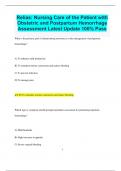
-
Relias: Nursing Care of the Patient with Obstetric and Postpartum Hemorrhage Assessment Latest Update 100% Pass
- Exam (elaborations) • 54 pages • 2024
-
Available in package deal
-
 BrilliantScores
BrilliantScores
-
- $11.99
- + learn more
Relias: Nursing Care of the Patient with Obstetric and Postpartum Hemorrhage Assessment Latest Update 100% Pass What is the primary goal of administering uterotonics in the management of postpartum hemorrhage? A) To enhance milk production B) To stimulate uterine contraction and reduce bleeding C) To prevent infection D) To manage pain B) To stimulate uterine contraction and reduce bleeding Which sign or symptom should prompt immediate assessment for potential postpartum hemo...

That summary you just bought made someone very happy. Also get paid weekly? Sell your study resources on Stuvia! Discover all about earning on Stuvia

